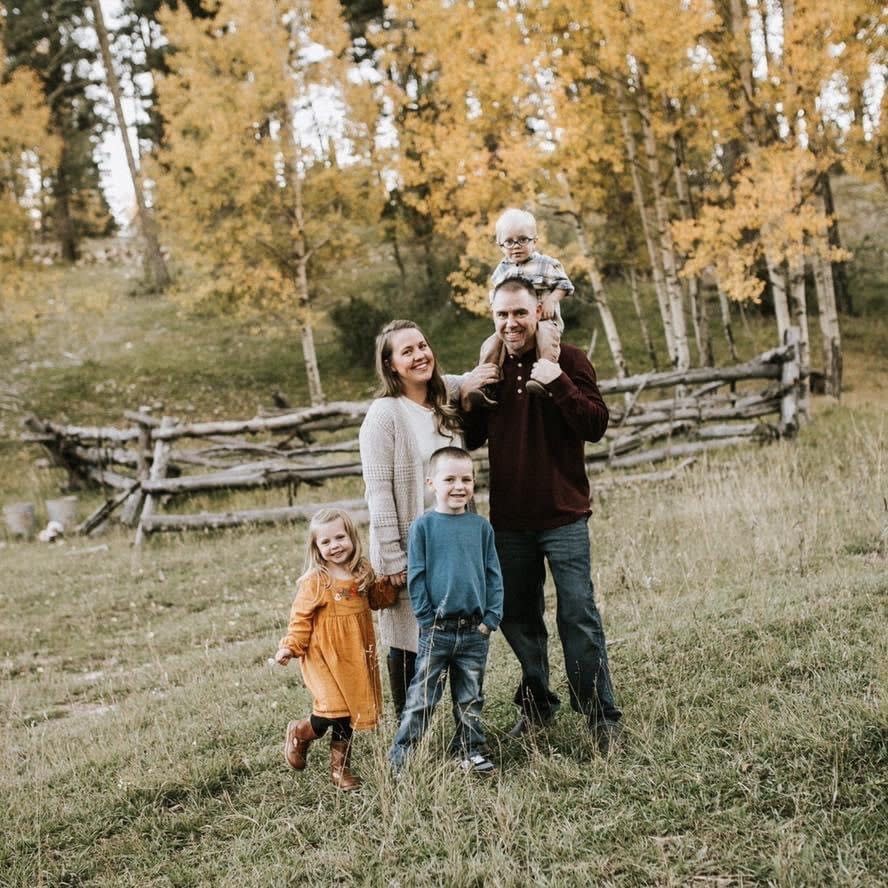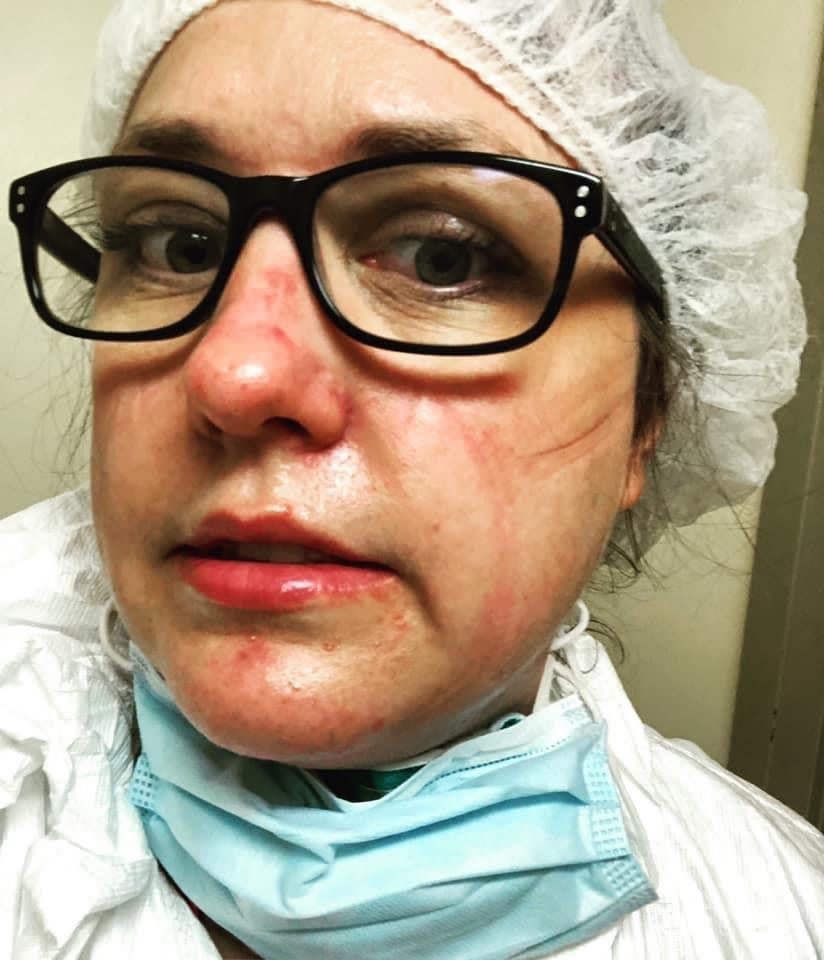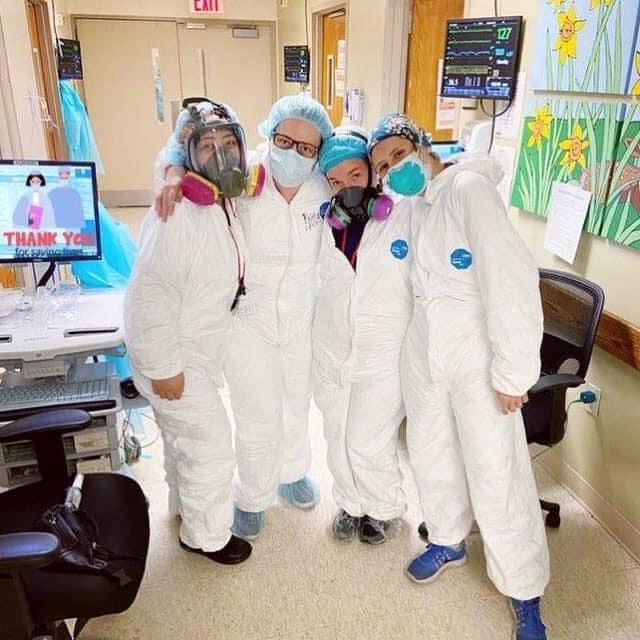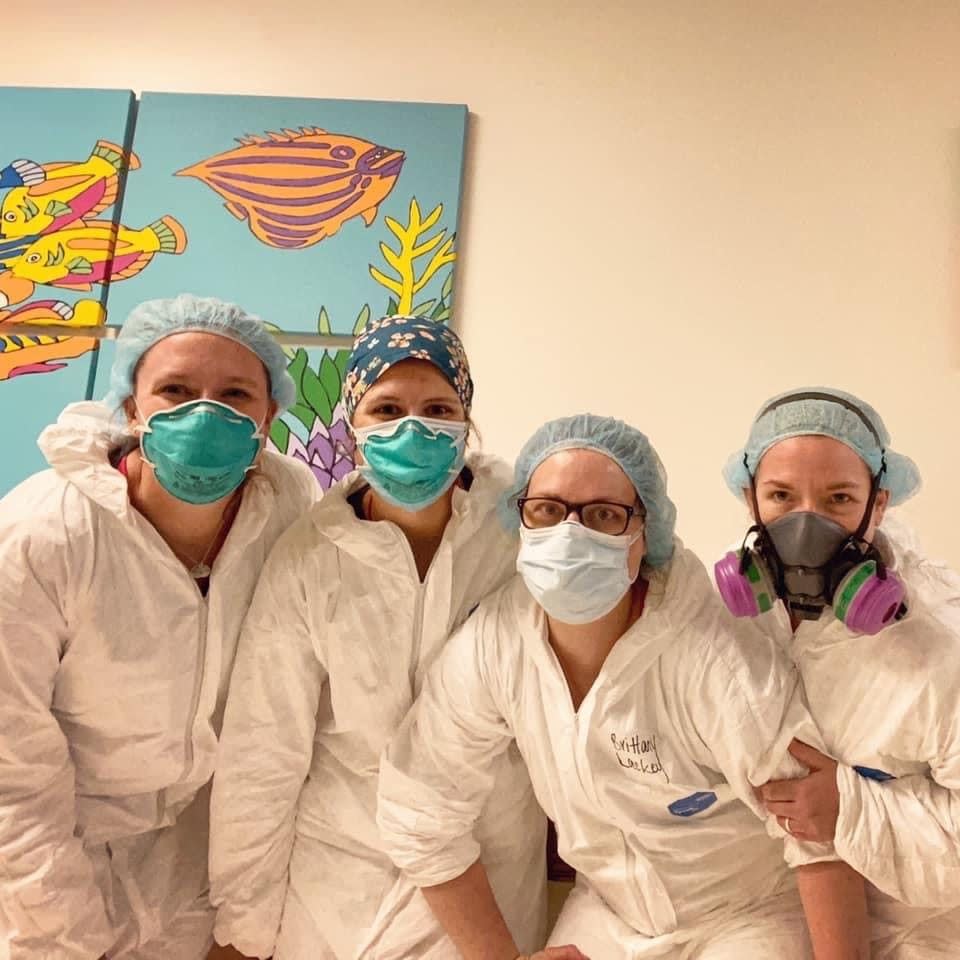Fighting COVID-19 In the Epicenter of the Disease Tested One Nurse's Faith and Changed Her Life

Brittany Jensen Lackey, a 33-year-old ICU nurse living in Cloudcroft, New Mexico, is hiding in the back of a car, watching her 6-year-old son, Jace, graduate Kindergarten. Having recently returned from Brooklyn, New York, where she spent four weeks on the front lines in the battle against COVID-19 at Interfaith Medical Center, she is finally home — sort of. It's day two of a 14-day mandatory quarantine, and while she is mere miles away from her family — and at the time of her son's graduation, mere feet — she's also so, so far away.
Her son's teachers know she is among the crowd of proud, eager parents — hidden in the background, trying to remain unseen. But her son does not know she has made it home. Trying to explain to him — or her other two children, ages 4 and 2 — that Mom cannot touch him, despite no longer being thousands of miles away, would simply be too difficult.
"[My son] FaceTimed me, so he thought I was watching him from far away," Lackey tells Woman's Day via phone while quarantining in Ruidoso, New Mexico, where she grew up. A member of her hometown had generously donated their cabin in the woods for her to stay, so for the first time in four weeks, she was no longer confined to a single-bed hotel room. "But I was there, sitting in the back of my car. I watched him graduate, and it was really cool, but it was also really heartbreaking. These are important milestones, you know? But it's OK. I got to be there."
Lackey has been a nurse for over 10 years, so caring for strangers is far from foreign to her — it is her job. Still, when COVID-19, a novel strain of the coronavirus that, to date, has killed more than 126,000 Americans, reached the United States and started ravaging populous cities like Seattle, Washington, Los Angeles, California, and New York, New York, she felt a visceral calling to leave the safety of her small town in New Mexico, and help.
"I felt the Lord calling me to go."
"I felt like He put that burden in my heart," she says. "But I also come from a community that's pretty untouched by COVID. And God forbid COVID hits us like it hit New York. But if it does, I pray that nurses from all over the country would come running to help me; come running to save my community; come running to save my family. It was just my turn to do the running, you know?"

The decision to leave her husband and three small children was not an easy one. While Lackey knew it was the Lord calling her to serve, an overwhelming fear of the unknown, the guilt of leaving her children, and the future status of her job at a local hospital weighed heavily on her mind.
"I was just seriously wrestling with it," she explains. "And I was scared. I also didn’t understand how all of it could work out. I have a job. I have kids. How could I just leave?" But after a week of sleepless nights and a consistent, heavily feeling, pulling her to go to New York, she decided to talk things out with her husband.
"I went to my husband and I said, 'I just feel like I have to go.' And I honestly thought he would be like, 'That’s great babe, but you’re not going.'" she says. "He took it in and waited a second before he responded, and then he said, 'You know, if there was something going on in this world and I could do something to make a difference, I would want to go. So I get it and I believe you should go. And we will be OK.'"
Her boss was just as supportive. Lackey assumed there was no way her job would grant her a month's worth of time off, but her place of employment ended up being among one of her biggest cheerleaders. "They packed me a bag of [personal protective equipment] and said, 'Go, we’ll figure it out,'" she says.
"Every single hurdle where I thought, 'Well, they’ll say no. Or they’ll say no,' they’ve been like, 'Go, we got you. We know you need to go and there’s a purpose for you feeling this burden. So go.'”
Lackey does not believe her husband, her job, or even her children's reaction to her want to leave home and enter the ongoing fight against an unparalleled public health crisis was serendipitous. This was no coincidence — this was God, she says.
"I didn’t know how I could say no when I had been given every door that I needed to open opened," she explains. "I just felt an unbelievable amount of peace when the decision was made and I knew it was from the Lord. I knew He was opening these doors and He placed this burden on my heart because, for whatever reason, I was supposed to go. And even though I was terrified and I was scared, I 100% knew that that was Him."
"It was very much like I had just been dropped into hell."
But after arriving in Brooklyn, she quickly realized her faith would be tested in ways she could have never imagined. And on her first day at Interfaith Medical Center in Bed-Stuy, a predominately Black neighborhood located in Brooklyn, New York, woefully underfunded and ravaged by systemic racism, she questioned her decision to join the fight against COVID-19.

"When I took the assignment, the CEO of the travel company had a conference call with all of us [nurses]," Lackey says, "She said, 'I just want you guys to know what you're walking into. I want you guys to all close your eyes and I want you to picture me loading you up in this airplane, strapping a parachute to your back, and me dropping you off into the middle of hell, and literally all we have to stop this virus is you guys.' And it made me cry and cry, because I'm picturing this and I have no concept. I can picture this and I can imagine, but until I was there.... well, that's exactly how it was," Lackey continues, her voice breaking. "I just... it was very much like I had just been dropped into hell."
When Lackey traveled to New York City to treat COVID-19 patients, it was the epicenter of the United States coronavirus pandemic. Thousands were dying daily; the near-constant sounds of emergency vehicle sirens pierced the sky at all hours, drowned out only by the 7:00 p.m. salute to health care workers — a city-wide call to arms of sorts, when residents would bang pots and pants, hoot, hollar, and scream their appreciation for the doctors, nurses, hospital cleaners, and other essential workers braving the possibility of exposure for the sake of others.
RELATED: Coronavirus Ground Zero: 'In 12 Days, the World Had Turned Upside DOWN
New York City hospitals were overwhelmed — nurses and doctors lacked access to personal protective equipment (PPE), and in its absence were utilizing trash bags, reusing masks. As a result, health care workers were getting sick and dying. And at Interfaith Medical Center, an underfunded hospital that had filed for bankruptcy in 2012, the most basic of necessities were out of reach for front-line workers like Lackey.
"When the little things — when we're running out of wipes and we're running out of tubings and we're running out of linen — when the little things are so hard, the big things aren't happening," she says. "The big, life-saving things that could save patient lives weren't happening, because we were too busy battling for these little things that we never should have had to battle for."
There was no grace period in which Lackey could adjust to her newfound reality. No chance to wade into the waters of COVID-19 and it's devastating affects on the human body. On her first day, sans any sort of orientation, she started treating patients as best she could.
"I walked in the door and was basically given an assignment and it was one of the most stressful things ever, because I had these people on these drips with pumps I'd never seen, on vents I'd never seen," Lackey explains. "I couldn't get on the hospital computer; I didn't have access to medications; and I was just told, 'Here, take care of these people.' Being throw into it all was hard enough, but we also coded multiple people on my first day. I got hit square in the face with the reality of what I walked into."

The reality of COVID-19, or how it was — and still is — disproportionately impacting Black communities did not cease during Lackey's tenure at Interfaith. Of all the patients she cared for during her four week stay, only one survived — a 90-year-old Black woman who, at the time of this interview, was out of the ICU but had not yet been discharged from the hospital. A May 2020 study published by Amfar, the Foundation for Aids Research, found that Black counties made up over half of the COVID-19 cases, and close to 60% of all COVID-19-related deaths. "The brunt of the COVID-19 epidemic is not going to be borne equally on all communities," Gregorio Millet, vice president of Amfar, told the Washington Post in May. "We will likely see greater COVID-19 deaths as well as cases in African American communities."
Lackey was bearing witness to the reality of these statistics; holding the hands of dying patients who, by virtue of where they lived and the color of their skin, were not privy to the treatment made accessible to the privileged, the white, and the affluent.
"I hope they get the help that everyone else is getting," Lackey says. "I hope that they get the treatments and the interventions that some of these richer hospitals get, that they don't even have access to."
"To this day, I question a lot."
In a far-away city, inundated with the task of caring for COVID-19 patients, Lackey turned to the only people who could truly understand what she was enduring: her fellow nurses. A mix of local nurses living in New York, and fellow travel nurses from across the country — including a large number who had quit their jobs to heed the call — it was her fellow health care workers who would end up helping Lackey stay the course. And visa versa.
"Nobody had family, or really anybody here, that they knew," Lackey says, "So we just bonded." And when it came to the local nurses, who had been battling COVID-19 long before Lackey and her fellow travel nurses arrived, the mutual respect was instant.
"I had heard about travel nurses coming to different hospitals and being mistreated by local nurses," she says. "But I didn’t feel that at all. I felt like, for the most part, when we walked in the door they just breathed a huge sigh of relief and were just so grateful that we were there."
But it was these nurses, Lackey says, that truly kept her going. And without their tenacity, their fortitude, and the palpable love they harbored for their community, she might not have been able to brave those four grueling, heart-wrenching weeks.
"I can't tell you how many of them I cried with," she says. "And I tried to be very intentional about any local nurse that I was with; just telling them how proud I am to be a nurse alongside them; that they're the true warriors in all this. They're going to be doing this for months more. They're the true warriors. They're the heroes." When Lackey left Brooklyn, she new the local nurses she left behind would continue to fight. COVID-19, Lackey knew, wasn't going anywhere.
Of course, she was right: as all 50 states have entered some sort of re-opening phase, COVID-19 cases have surged. As of June 23, seven states have reported the highest number of COVID hospitalizations since the pandemic began. On Wednesday, June 24, the United States reported 36, 880 cases — the highest number of confirmed COVID-19 in over two months. Multiple states, including Texas, have halted reopening efforts in the wake of an increase in COVID-19 cases. Some of travel nurses Lackey worked beside in Brooklyn are now traveling to states like Texas and Arizona to fight the rise in COVID-19 cases in those states, she says. And given that the president of the United States recently admitted to purposefully directing his administration to slow down COVID-19 testing so the country's number of confirmed cases would appear lower than it actually is, then followed up this admission by defunding 13 COVID-19 testing sites in five states, this trend is likely to continue.

Which is why, in many respects, the greatest battle Lackey faces lies before her: the battle for her mind. In the wake of so much loss, she wonders what her purpose really was. Why did she go to New York City? Why did she heed the call? Why wasn't she, and her fellow nurses, able to save more lives?
"To this day, I question a lot," she explains. "Like OK, God: what was my role? I was really naive, and I thought I was going to make this huge difference. I thought I was going to save lives. So I'm still wrestling with, like, what was the point? So in a lot of ways, that's testing me and my faith."
"But it's also growing it," Lackey continues. "Maybe there are a lot of things I haven't seen yet. Maybe there are a lot of things He is still working out; a lot of details that I don't know, and maybe I will never know. Maybe, just maybe, once I get to heaven, these people that I didn't think heard me praying over them? Maybe they'll let me know that they did hear me."
You Might Also Like

